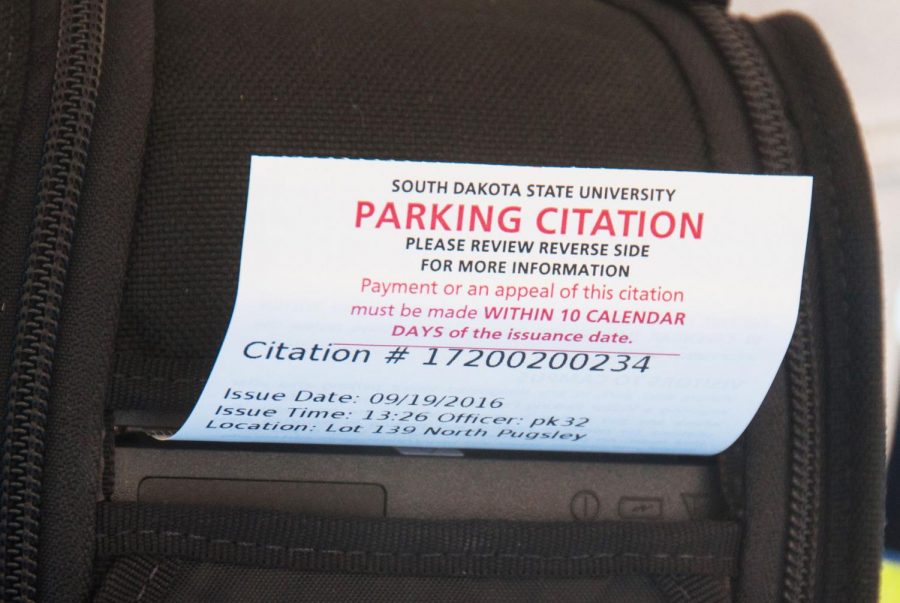Parking Services continues to command traffic
Parking Enforcement Specialist Jeff VanGerpen places a ticket onto a vehicle on Sept. 19. Typical violations include parking in the wrong lot or not having a permit.
September 21, 2016
More than 12,000 students. More than 7,000 cars on campus. More than 170 vehicle parking lots. Only five parking ambassadors.
South Dakota State’s Parking Services has its work cut out.
In April 2010, SDSU’s Parking Services was created and took up the responsibility of issuing parking permits on campus. In the fall of 2012, Parking Services began ticketing vehicles weekdays from 7 a.m. to 4 p.m., splitting this responsibility between parking ambassadors and University Police Department officers.
Jason Soren, Parking Services administrator, estimates between 20 to 30 tickets are issued to drivers parked on campus every day. He said Parking Services makes an effort to cover all lots within a week, but often prioritizes reserved lots because its occupants often pay higher fees for those spaces.
Soren noticed a correlation between the number of citations and time of day. He said Mondays, Wednesdays and Fridays have more citations administered because more students attend classes. Adverse weather like snow and rain as well as popular on-campus events also contribute to an increase in tickets.
Parking Services employs just five parking ambassadors, both student and non-student, to issue citations to illegally-parked cars across the campus. UPD distributes citations after business hours and on weekends.
The most common parking offense Soren sees on campus involves parking permits.
“The most common violations we see is one for no-permit parking or a ‘wrong-permit-in-a-wrong-lot’ violation,” Soren said.
He said for these citations, a first offense is typically set at $30 and for any following this, the price is increased to $50.
Other parking citations include those for parking in an illegal space, like a no-parking area or near a fire hydrant, parking in a disorderly way, parking without paying a meter or parking in a handicap-only space without a permit. Prices for these citations range from $30 to $200, the highest price being for illegal handicap parking.
If citations are not paid by a student within 10 days, a $10 fine is added to the existing citation. After 25 days, the charge is added to the student’s tuition on their account to be collected. Students may appeal their citations online if they feel they were not at fault for their citation or if they were not informed that their parking was against regulation. The Parking Services office sees about 30 to 40 requests for appeal each month.
Derek Peterson, director of business and auxiliary operations, said the money goes to two places.
“The money is funneled back to support the parking services, the office and staff and all of our software and equipment we use,” Peterson said. “Another huge part of it goes back into (maintaining) the parking lots themselves.”
John Schuh, sophomore business economics major, commutes to SDSU. Schuh received a parking citation for $30 two weeks ago for parking in a reserved lot after finding that the commuter lot located near the Animal Science building was full.
“It takes three minutes for me to get to campus, but sometimes it’s about 10 minutes just to find a parking spot,” Schuh said. “The reserved parking lot by Dairy Science is way bigger than the little commuter lot by Animal Science and it’s almost never even half full.”
Jeff VanGerpen is a parking enforcement specialist for Parking Services and has spent much of his time on SDSU’s campus administering tickets for the past two years.
“The more vehicles that you park into a small area, the greater frustration people feel, and that’s understandable,” VanGerpen said. “Not everyone can have a front row parking spot. But there are always parking spots available, it’s just not where people want it to be sometimes.”
Soren agreed that Parking Services is not at fault and is only trying to keep order on campus.
“We aren’t ever out to get students or faculty,” Soren said. “We’re just trying to keep things safe here and in-control with the 10,000 people we have on-campus. We want everyone to have a great college experience here, even if they don’t think about parking as something that is a ‘college experience.’”

























